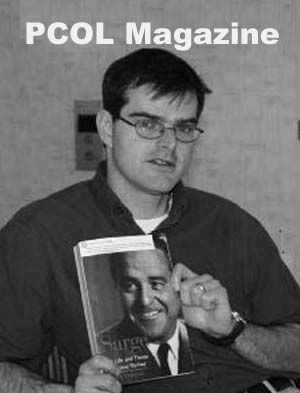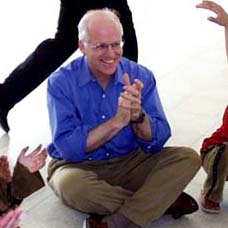
As a formerly Very Short Person, I found two of Hall’s arguments especially interesting. The first is that how tall you end up as an adult matters less than when you grow. Hall cites a wealth of evidence suggesting that how much you are paid in adulthood is determined by how tall you were at age 16. Everything that happens during the crucible of adolescence — when “personality ... is perched on a fulcrum of self-esteem so fragile it’s like an I-beam balanced on an egg” — is emblazoned deeply into consciousness, and stays there. Even after becoming a six-foot-tall adult — not to mention a famous, multimillionaire cartoonist — Garry Trudeau declined to attend a high school reunion because “adolescent hierarchies have a way of enduring; I’m sure I am still recalled as the Midget I myself have never really left behind.” Scott Stosell is the authorized biographer of Founding Peace Corps Director Sargent Shriver.
Scott Stossel reviews "Size Matters"
The Height of Success
By SCOTT STOSSEL
Published: November 5, 2006
To the many indignities visited upon shorter than average males — lower incomes, disadvantage in mate selection, cut rates for their deposits at the local sperm bank, long odds of making the N.B.A. — has now been added this one: short people are stupider than tall people. That’s the finding of a recent study by two Princeton economists who conclude, painfully for those of us who are south of 5 feet 9 inches, that the reason taller people make more money is that they are smarter.
That finding was published too late to make it into Stephen Hall’s provocative book, but it’s in keeping with the litany of obstacles arrayed against short men that he documents in “Size Matters.” Consider the very word “stature.” Its primary definition refers to physical height, but it can also connote everything from presence and charisma to virtue and importance; on a metaphorical level, height and worthiness of esteem are linked in the human mind. “Nobility of soul accompanies tallness of body,” wrote one 18th-century German physician, reflecting the conventional wisdom of the time. Repeated studies in the modern era have shown that people unconsciously ascribe positive qualities to the tall: in addition to being deemed more intelligent, tall people are automatically considered more likable, more dependable and more commanding. It seems that benefits accrue to the tall beginning almost from birth, and then keep accruing, leading to what is, generally speaking, a society where the tall lead and the short follow — an “altocracy,” as Hall puts it. Only 3 of 43 American presidents — James Madison, Benjamin Harrison and Martin Van Buren — have been under 5 feet 7 inches, and it is well known that the taller of two presidential candidates usually wins the election.
The association of height with cultural desirability and even existential value has deep historical roots. The Roman historian Tacitus, writing in the first century A.D., associated height with both strength and moral virtue. Drawing on Tacitus and his successors, King Frederick William of Prussia became obsessed with recruiting — and breeding — an army of behemoths in the early 1700’s. His so-called Potsdam Giants regiment was led by a man reported to be over 7 feet tall, and included at least one mercenary well over 8 feet; none of the Giants were under 6 feet. (James Tanner, the dean of human growth studies, has observed that this was probably the tallest group of men assembled before the advent of professional basketball in America.) Other militaries emulated Frederick (taller soldiers had longer strides, could thrust their bayonets farther, and had an easier time reloading their long rifles) and Hall argues that it was at this point in history — when tall soldiers were more coveted than shorter ones — that the market (and moral) value of height first became institutionalized.
As a man of a mere 5 feet 5 and three-quarters inches himself, Hall is on something of a quest, seeking not just to understand the science and culture of stature but also to come to terms with what the cartoonist Garry Trudeau has called his “inner shrimp” — that distinctive “I’m smaller than the rest of the world so I hope I don’t get beaten up” outlook that is imprinted at an early age and never dispelled, no matter what our final adult heights. Mixing traditional science reporting with personal anecdote, Hall ranges widely across popular culture and the scientific literature to explore such issues as what the average height of a population can reveal about culture and society (Why are the Dutch so tall? And why are Americans becoming relatively shorter?), and how the Food and Drug Administration’s approval of human growth hormone as a “treatment” for undersize children in 2003 changed the politics and science of height. Here’s an interesting philosophical question: If what matters psychologically is relative height, by treating short children with growth hormone, aren’t we creating a whole new class of undersize “victims,” the untreated kids they surpass in height? Have we launched an arms race of avoiding shortness? If so, it’s not hard to understand why. As Hall puts it, height matters because “it clearly has an impact on social perceptions, romantic interactions, workplace hierarchies and our self-perception long after we’ve stopped growing.”
As a formerly Very Short Person, I found two of Hall’s arguments especially interesting. The first is that how tall you end up as an adult matters less than when you grow. Hall cites a wealth of evidence suggesting that how much you are paid in adulthood is determined by how tall you were at age 16. Everything that happens during the crucible of adolescence — when “personality ... is perched on a fulcrum of self-esteem so fragile it’s like an I-beam balanced on an egg” — is emblazoned deeply into consciousness, and stays there. Even after becoming a six-foot-tall adult — not to mention a famous, multimillionaire cartoonist — Garry Trudeau declined to attend a high school reunion because “adolescent hierarchies have a way of enduring; I’m sure I am still recalled as the Midget I myself have never really left behind.”
The other appealing argument Hall makes is that there is evolutionary and moral value in being puny. Darwin himself intriguingly suggested that while there is a general evolutionary bias toward greater size, survival-of-the-fittest pressures on our ancestors, who were smaller than their primate competitors, may have led to the development of human intelligence. Or, as Hall speculates, “the relative smallness and weakness of smaller human ancestors might be responsible for nothing less than the birth of civilization.” Speaking from his own experience, Hall surmises that being short as a boy forced him to develop not only greater mental quickness and wit but also greater empathy and understanding.
And made him also, perhaps, a more appealing mate than his alpha male competitors. (Hall is happily married — to a woman almost four inches taller — with two kids.) Herewith some advice for the ladies: When surveying the scrum that is the schoolyard (or the boardroom), resist the strapping breast-beater at the top of the pile and consider the runt at the bottom. He’s less likely to become president, but he might turn out to be the better husband.
Scott Stossel, the managing editor of The Atlantic Monthly, is the author of “Sarge: The Life and Times of Sargent Shriver.”


















